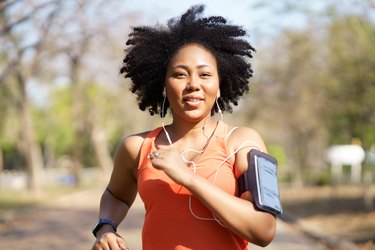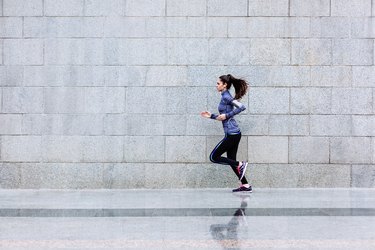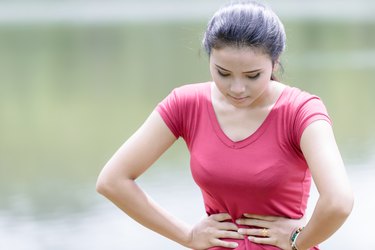
If you're curled up under the covers with period cramps and a bloated belly, lacing up your gym shoes is likely the last thing on your mind. We get it: A heavy flow can make you feel awful.
You may be wondering, is it OK to work out on your period? If you're up to it, moving around might help ease period cramps and other menstruation symptoms.
Video of the Day
Here, Allison K. Rodgers, MD, a board-certified ob-gyn, reproductive endocrinologist and director of education at the Fertility Centers of Illinois, explains how monthly menstruation can affect your workouts, how a strategic sweat session can slash period symptoms and what types of exercise are safe to do during that time of month.
What Is the Menstrual Cycle, Anyway?
The menstrual cycle refers to the series of hormonal changes that happen within your body as it preps for the possible chance of pregnancy each month. The whole cycle — which may vary in length from 21 to 35 days — begins on the first day of your period (restarting when your next period begins) and consists of four phases, per the Cleveland Clinic:
- Menses phase (approximately day 1 to day 5): the uterus sheds its lining
- Follicular phase (approximately days 6 to 14): the uterine lining thickens and follicles in the ovaries grow, forming a mature egg
- Ovulation (approximately day 14 in a 28-day menstrual cycle): the ovary releases the egg
- Luteal phase (approximately days 15 to 28): the egg travels through the fallopian tubes to the uterus
How Your Body Changes During Your Period
Anyone with a uterus is familiar with Aunt Flo's less-than-desirable effects on your body. But here's what's actually going on inside you:
Your period occurs during the menses phase, the first part of your menstrual cycle. In this phase, your body sheds the lining of the uterus through your vagina (this is the blood you see in your undies) if you are not pregnant. Menses usually lasts between three to five days, but anywhere from two to seven days is considered normal, according to the Cleveland Clinic.
During this short period of time (pun intended), a lot is happening in your body hormonally.
"Your estrogen and progesterone are very low," Dr. Rodgers says. And this can contribute to the characteristic symptoms of menstruation, including:
- Bloating
- Cramping
- Mood swings
- Difficulty sleeping
- Food cravings
- Tenderness in the breasts
- Acne
How Does Your Period Affect Your Workouts?
When it comes to workouts for when you're on your period, your energy levels — and motivation to hit the gym — might be pretty low during your period. But this is largely due to the dip in hormones, not blood loss.
For a normal period, the amount of bleeding shouldn't make you feel lightheaded or become anemic, Dr. Rodgers says. So, while you might feel a bit pooped on your period, it's still safe to exercise.
However, if your period lasts longer than seven days, your flow is more heavy than usual or you're bleeding enough to soak through more than one pad or tampon every hour or so, contact your doctor, as this may be a sign of something more serious, per the Mayo Clinic.
Benefits of Exercising During Your Period
For some, getting their period coincides with more energy, according to the Office on Women's Health.That's because hormone levels, which plunge just prior to your period, begin to rise again.
Additionally, aerobic exercise "helps your blood circulation and the release of 'feel-good hormones' called endorphins," according to Nationwide Children's Hospital. "These can also work together to soothe headaches and improve mood."
And, according to a small September 2016 study conducted by the Umea University Department of Community Medicine and Rehabilitation Sports Medicine Unit, your estrogen levels tend to be higher during the first two weeks of your cycle (the beginning of your period to ovulation) than the last two weeks of your cycle. This means you may see a boost in physical gains during this time.
The Best Exercises to Do on Your Period
If you're feeling tired, bloated and crampy, a spirited sweat session is among the best workouts to do on your period and might be just what the doctor ordered to decrease your period-related discomfort.
Dr. Rodgers recommends doing a strenuous cardio workout. Raising your heart rate for a sustained period releases natural endorphins, which can help relieve period cramps and improve your mood, she explains. (Swimming counts, by the way, and there are plenty of leak-proof products for swimming with your period.)
Case in point: A September 2019 review in the Cochrane Database of Systematic Reviews concluded that regular exercise (regardless of intensity) helped reduce menstrual pain to a significant degree.
And if you can't muster enough oomph for high-energy exercise during your period, slow, gentle movements like stretching and yoga are amazing alternatives because they can help you feel more relaxed, Dr. Rodgers says.
In fact, studies show that doing yoga can help lower levels of inflammation and cortisol (a stress hormone) in the body, according to Harvard Health Publishing.
Plus, yoga exercises can also temper painful period cramps. That's what one small February 2017 study in the Journal of Bodywork and Movement Therapies found. Compared to a control group (who didn't do any form of exercise), people who practiced yoga twice a week, for a half hour each day experienced a substantial improvement in period pain and overall quality of life within three months.
According to Nationwide Children's Hospital, a few recommended yoga poses include:
1. Cat-Cow Pose (Marjaiasana Bitilasana)
- Begin on your hands and knees.
- Exhale as you round your back, pull the belly button toward your spine and tuck your chin toward your chest.
- Starting at the tailbone, release one segment of your spine at a time, relaxing through the lumbar spine, thoracic spine (mid-back) and finally, your cervical spine as you lift your chin upward into full flexion.
- Then reverse the motion. Be aware of what segments feel stuck. Breathe into these spaces and remember to move slowly.
- Continue to move between Cat and Cow pose, letting your body move with your breath.
2. Cobra Pose (Bhujangasana)
- Lie on your stomach with your legs together, the tops of your feet down and your hands under your shoulders.
- On an inhale, peel your chest away from the floor. Roll your shoulders back and down your spine as you straighten your arms as much as your flexibility allows.
- Be careful not to go too far too soon. Breathe deeply and maintain awareness of the feedback your body is providing to avoid stress or strain.
- Lower your chest back down to the floor in the starting position.
3. Fish Pose (Matsyasana)
- Lying on your back with your legs together and arms close to your body, slide your fingertips under your butt.
- Inhale as you arch your upper back and come onto the crown of your head.
- Hold and breathe.
3 Tips for Exercising on Your Period
Again, to answer the question, is exercise good for your period, all types of exercise are OK to do during menstruation. But here are a few general guidelines to consider when planning workouts to do on your period.
1. Do Whatever Feels Good
"I recommend choosing a type of movement that you enjoy," Dr. Rodgers says.
Again, when exercising while on your period, you're looking to leverage those feel-good endorphins. Any activity — from gentle walking to a HIIT class — can help your brain produce these positive chemicals.
2. Listen to Your Body
Thanks to the hormonal shifts, your sleep may suffer during your period. So, if you're feeling fatigued, you may need to shorten your period workouts or take a rest day, Dr. Rodgers says.
3. Modify Your Menstrual Products
"On very heavy days, you may need to change your period products before your workout," Dr. Rodgers says. For instance: "Consider using tampons or menstrual cups to avoid chafing of a pad against your skin," she says.
- Mayo Clinic: “Menstrual cycle: What's normal, what's not”
- Cleveland Clinic: “Normal Menstruation”
- Cochrane Database of Systematic Reviews: “Exercise for dysmenorrhea”
- Harvard Health Publishing: “Yoga could slow the harmful effects of stress and inflammation”
- Journal of Bodywork and Movement Therapies: “Effect of yoga on the menstrual pain, physical fitness, and quality of life of young women with primary dysmenorrhea”
- Office on Women's Health: "Physical activity and your menstrual cycle"
- Nationwide Children's Hospital: "Yoga Exercises and Menstrual Cramps"
- Umea University Department of Community Medicine and Rehabilitation Sports Medicine Unit: "Training and hormones in physically active women: with and without oral contraceptive use"
Is this an emergency? If you are experiencing serious medical symptoms, please see the National Library of Medicine’s list of signs you need emergency medical attention or call 911.



